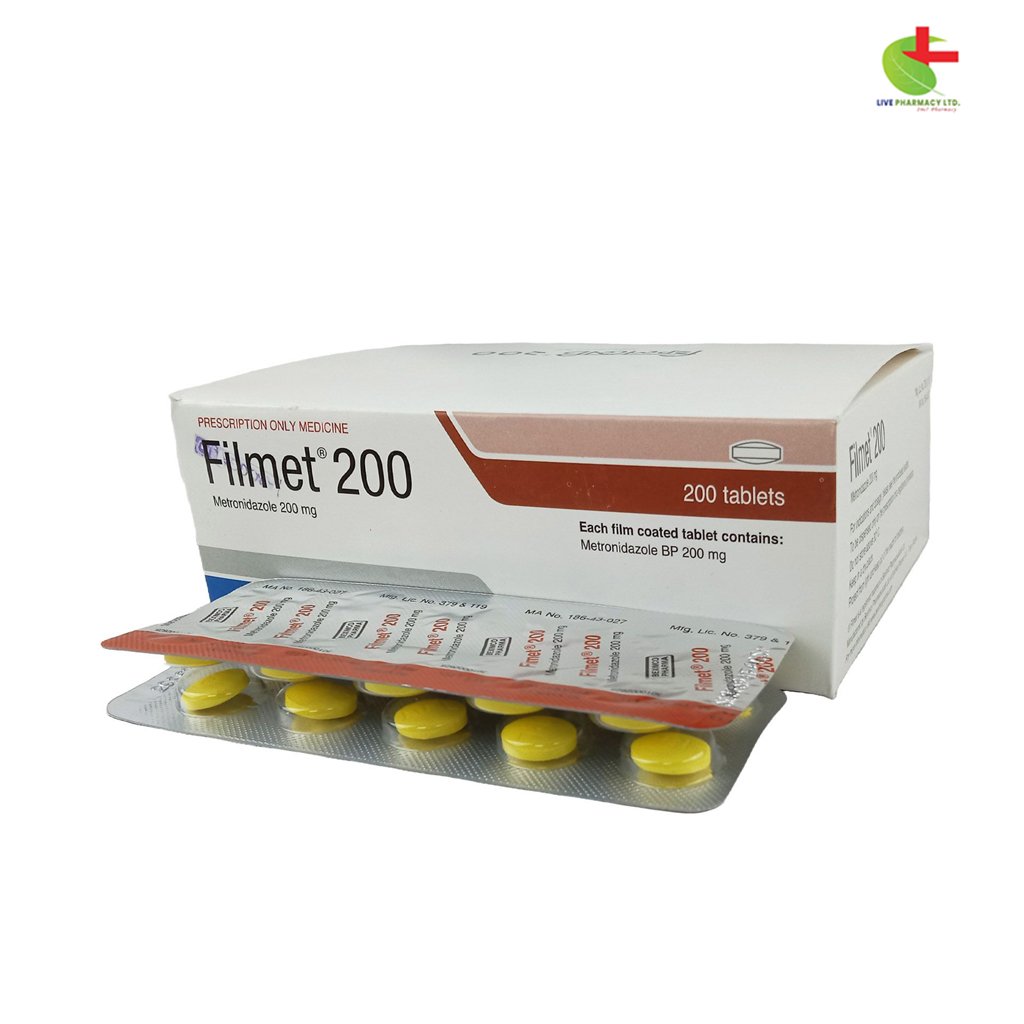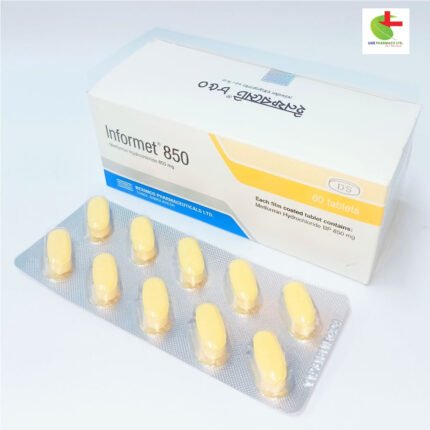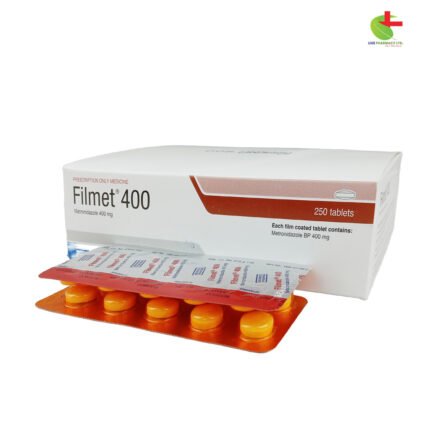Filmet 200
10.00৳ Strip
- Filmet treats infections caused by anaerobic bacteria and protozoa.
- Effective for trichomoniasis, amoebiasis, giardiasis, bacterial vaginosis, and acute dental infections.
- Available in tablets, vaginal gel, and IV infusion forms.
- Consult a healthcare professional for proper use and dosage.
 Brand
Brand
|
Beximco Pharmaceuticals Ltd |
|---|---|
 Generics
Generics
|
Metronidazole |
 Type
Type
|
Tablet |
Indications
Filmet is prescribed for the treatment of various conditions, including:
- Preventing Post-Operative Infections: Effective against anaerobic bacteria such as Bacteroides and anaerobic streptococci.
- Treating Anaerobic Infections: Used for septicaemia, bacteraemia, peritonitis, brain abscesses, pelvic abscesses, pelvic cellulitis, and post-surgical wound infections caused by anaerobes.
- Managing Urogenital Trichomoniasis: Effective for trichomoniasis infections.
- Addressing Bacterial Vaginosis: Also known as non-specific vaginitis.
- Combating Amoebiasis: Treats all forms, including intestinal amoebiasis, extra-intestinal amoebiasis, and asymptomatic cyst passers.
- Treating Giardiasis: Effective for giardiasis infections.
- Acute Ulcerative Gingivitis: For the treatment of acute ulcerative gingivitis.
- Managing Infected Leg Ulcers and Pressure Sores: Treats leg ulcers and pressure sores with anaerobic infections.
- Addressing Acute Dental Infections: Effective for dental infections caused by anaerobic organisms.
- Managing Antibiotic-Associated Pseudomembranous Colitis: Useful in treating colitis associated with antibiotic use.
Pharmacology
Metronidazole, an imidazole-class antibacterial drug, functions as an antiprotozoal agent. The 5-nitro group of Metronidazole is metabolized by anaerobes, leading to a reduction that interacts with DNA, providing its bactericidal effects.
Dosage & Administration
Tablet and Suspension:
- Trichomoniasis:
- Adults & Children over 10: 200 mg three times daily, or 400 mg twice daily for 7 days; alternatively, 800 mg in the morning and 1-2 gm at night for 2 days, or a single dose of 2 gm for 1 day.
- Children: 7-10 years: 100 mg three times daily; 3-7 years: 100 mg twice daily; 1-3 years: 50 mg three times daily.
- Intestinal Amoebiasis:
- Adults & Children over 10: 800 mg three times daily for 5 days.
- Children: 7-10 years: 400 mg three times daily; 3-7 years: 200 mg four times daily; 1-3 years: 200 mg three times daily.
- Extra-intestinal & Asymptomatic Amoebiasis:
- Adults & Children over 10: 400-800 mg three times daily for 5-10 days.
- Children: 7-10 years: 200-400 mg three times daily; 3-7 years: 100-200 mg four times daily; 1-3 years: 100-200 mg three times daily.
- Giardiasis:
- Adults & Children over 10: 2 gm once daily for 3 days.
- Children: 7-10 years: 1 gm once daily; 3-7 years: 600-800 mg once daily; 1-3 years: 500 mg once daily.
- Acute Ulcerative Gingivitis:
- Adults & Children over 10: 200 mg three times daily for 3 days.
- Children: 7-10 years: 100 mg three times daily; 3-7 years: 100 mg twice daily; 1-3 years: 50 mg three times daily.
- Acute Dental Infections:
- Adults & Children over 10: 200 mg three times daily for 3-7 days.
- Bacterial Vaginosis:
- Adults & Children over 10: 400 mg twice daily for 7 days or a single dose of 2 gm.
- Leg Ulcers and Pressure Sores:
- Adults & Children over 10: 400 mg three times daily for 7 days.
- Anaerobic Infections:
- Adults & Children over 10: 800 mg initially, followed by 400 mg three times daily for 7 days.
- Children: 1-10 years: 7.5 mg/kg three times daily.
- Surgical Prophylaxis:
- Adults & Children over 10: 400 mg three times daily starting 24 hours before surgery for 1 day.
- Children: 1-10 years: 7.5 mg/kg three times daily.
Vaginal Gel:
- Administer one applicator full (about 5 grams containing 37.5 mg of Metronidazole) intravaginally once or twice daily for 5 days. For once-daily dosing, use at bedtime.
Suppository:
- Anaerobic Infections:
- Adults: 1 g every 8 hours for 3 days, then every 12 hours.
- Children 5-10 years: 500 mg every 8 hours for 3 days, then every 12 hours; Over 10 years: Adult dose.
- Surgical Prophylaxis:
- Adults: 1 g 2 hours before surgery; up to 3 additional doses of 1 g every 8 hours for high-risk procedures.
- Children 5-10 years: 500 mg 2 hours before surgery; up to 3 additional doses of 500 mg every 8 hours for high-risk procedures.
IV Infusion:
- Metronidazole IV infusion should not be diluted or mixed with other drugs.
- Adults and Children over 12 years: Infuse 500 mg every 8 hours at 5 ml/minute, with a maximum of 4 g per 24 hours. Generally, a 7-day treatment is adequate, but can be extended if needed. For surgical prophylaxis, administer shortly before surgery, followed by 8-hourly doses for the next 24 hours.
- Children under 12 years: 7.5 mg/kg body weight every 8 hours at 5 ml/minute.
Interactions:
- Disulfiram: May cause psychotic reactions when used concurrently.
- Alcohol: Avoid alcoholic beverages and products containing alcohol during and at least one day after therapy to prevent disulfiram-like reactions.
- Oral Anticoagulants (Warfarin): May increase bleeding risk; monitor prothrombin time and adjust dosage accordingly.
- Lithium: May increase lithium levels.
- Cyclosporin: Monitor serum cyclosporin and creatinine levels.
- Phenytoin/Phenobarbital: May reduce Metronidazole levels.
- 5-Fluorouracil: Can increase toxicity of 5-fluorouracil.
- Busulfan: May increase busulfan toxicity.
Contraindications:
Metronidazole is contraindicated in individuals with a known hypersensitivity to Metronidazole or other Nitroimidazole derivatives.
Side Effects:
Possible side effects include metallic taste, nausea, vomiting, diarrhea, drowsiness, and rashes.
Pregnancy & Lactation:
Metronidazole is classified as US FDA Pregnancy Category B. Use during pregnancy only if necessary. It is excreted in breast milk; exercise caution when administering to nursing mothers.
Precautions & Warnings:
- If extended use is necessary, monitor hematological parameters and watch for adverse reactions like neuropathy.
- Use with caution in patients with hepatic encephalopathy.
- Warn patients that urine may darken during treatment.
Use in Special Populations:
- Hepatic Impairment: Dose reduction may be necessary for patients with severe hepatic impairment. Monitor for symptoms of encephalopathy.
- Renal Impairment: No dose adjustment is needed for renal failure, but re-administer after hemodialysis. No routine adjustments are needed for peritoneal dialysis.
Overdose Effects:
Overdoses up to 12 g have been reported with symptoms of vomiting, ataxia, and disorientation. There is no specific antidote; symptomatic and supportive treatment is recommended.
Therapeutic Class:
Amoebicides, Anti-diarrhoeal, Antiprotozoal
Storage Conditions:
Store below 30°C, protected from light, and out of reach of children. Do not use past the expiration date.













Reviews
There are no reviews yet.